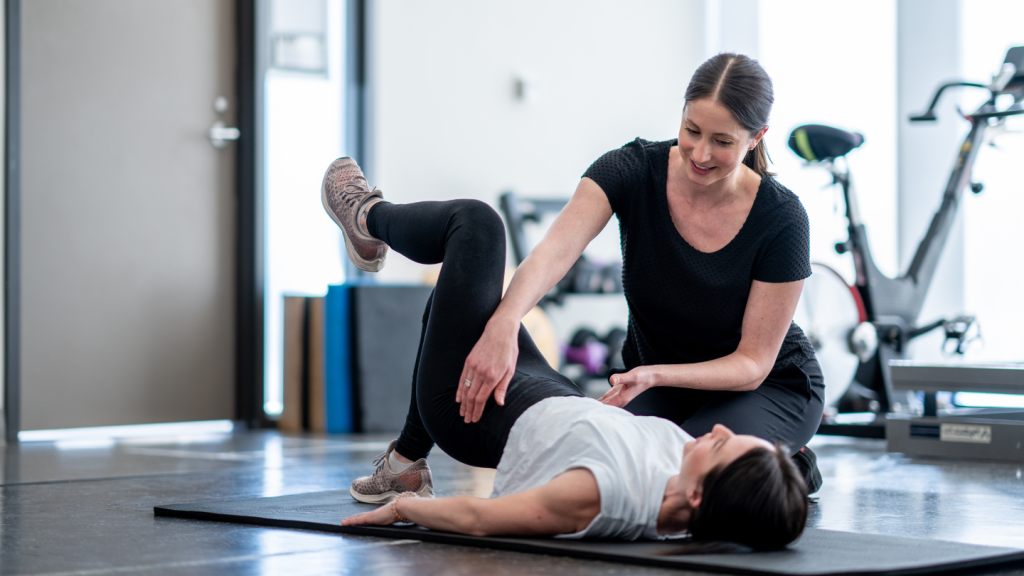
Which Exercises Prevent Hiatal Hernias?
A hiatal hernia occurs when a portion of the stomach pushes upward through the diaphragm and into the chest cavity. While many people associate hiatal hernias with aging or genetics, the truth is that posture, abdominal pressure, and muscle weakness often play major roles. The right hiatal hernia exercises, especially breathing, stretching, and low-pressure core movements, can strengthen the diaphragm, support digestion, and reduce your risk of developing or worsening symptoms.
Below is a complete, evidence-informed guide to the best exercises for hiatal hernia prevention, the safest movements if you already have symptoms, and the exercises you’ll want to avoid.
What Is a Hiatal Hernia?
A hiatal hernia happens when the upper part of the stomach slips through the hiatus, a small opening in the diaphragm where the esophagus passes. This displacement can weaken the surrounding tissues and contribute to acid reflux, heartburn, chest pressure, bloating, and difficulty swallowing. People often describe the sensation differently, so understanding what a hiatal hernia typically feels like can offer helpful context.
There are two main types:
- Sliding hiatal hernia: the stomach slides in and out of the chest cavity
- Paraesophageal hernia: part of the stomach pushes up next to the esophagus and stays there
Most cases involve the sliding type, which often responds well to exercises for hiatal hernia and posture-focused movements. Learning more about the full range of signs and symptoms can also help individuals identify a hiatal hernia earlier.
Why Certain Exercises Help Prevent Hiatal Hernias
The diaphragm is the primary muscle responsible for breathing. When it weakens, due to poor posture, prolonged sitting, stress, aging, or inactivity, the opening where the stomach meets the esophagus can loosen. This makes it easier for the stomach to shift upward.
Exercises for a hiatal hernia aim to:
- Strengthen the diaphragm
- Improve posture and spinal alignment
- Reduce abdominal pressure
- Activate deep core support muscles
- Maintain healthy digestion
Choosing safe exercises for hiatal hernia is essential because the wrong movements can increase pressure and worsen symptoms.
Best Exercises to Prevent a Hiatal Hernia

1. Diaphragmatic Breathing
This is the most effective and widely recommended of all hiatal hernia exercises.
How to do it:
- Lie on your back or sit upright.
- Place one hand on your belly and one on your chest.
- Inhale through your nose so your belly expands.
- Exhale through pursed lips.
- Repeat for 5–10 minutes.
Diaphragmatic breathing strengthens the muscle responsible for keeping the stomach in place, making it one of the best exercises for hiatal hernia prevention.
2. Deep Belly Breathing
A variation often used in yoga and physical therapy, this promotes relaxed abdominal muscles and improved esophageal function.
3. Rib Expansion Breathing
This exercise helps widen the rib cage, improve upper-diaphragm mobility, and reduce tension that contributes to reflux symptoms.
Stretches That Reduce Abdominal Pressure
These exercises to help hiatal hernia symptoms release tension, open the chest, and improve spinal flexibility.
4. Cat-Cow Stretch
This gentle movement supports digestion, releases back tension, and helps maintain proper alignment.
5. Child’s Pose
A calming stretch that lengthens the spine and reduces abdominal pressure, ideal for symptom relief.
6. Seated Overhead Reach
Lengthens the diaphragm and improves posture. This movement is especially helpful for people who sit for long periods.
7. Thoracic Extension (Over Foam Roller)
Upper-back mobility is essential for reducing abdominal compression. Perform slowly and gently.
Strengthening Exercises for a Stronger Core & Diaphragm

These movements are appropriate core exercises with hiatal hernia because they avoid crunching, straining, or pressure spikes.
8. Pelvic Tilt
A simple but effective way to activate deep core stabilizers.
9. Alternating Leg Straighteners
Strengthens the lower abdominals without added pressure on the diaphragm.
10. Deep Core Activation (No Crunches)
Also known as transverse-abdominis activation, this is safe and effective for anyone needing core exercises for hiatal hernia.
Best Yoga Poses for Hiatal Hernia Prevention
Mountain Pose with Deep Breathing
Trains posture and supports natural rib expansion.
Cobra Pose (Gentle Extension)
Opens the chest and reduces pressure on the diaphragm.
Modified Bridge Pose
Strengthens core and glutes without engaging high-pressure ab movements.
Exercises That Help Improve an Existing Hiatal Hernia
If you already have symptoms, these safe exercises for hiatal hernia are recommended:
Shoulder Blade Squeezes
Supports posture and reduces forward slump that worsens symptoms.
Seated Deep Breathing
A gentle, effective diaphragmatic technique.
Clinician-Guided Diaphragm Elevation Technique
Often used by physical therapists and chiropractors to reposition the stomach and ease symptoms. Many people also wonder whether a hiatal hernia can be improved independently through lifestyle changes, gentle movement, or home strategies.
Exercises to Avoid if You Have a Hiatal Hernia
Avoid any movement that increases abdominal pressure:
- Sit-ups or crunches
- Heavy lifting
- Weighted twisting
- Inverted exercises
- High-intensity core work
These are not considered safe exercises for hiatal hernia and can worsen symptoms or cause recurrence. For those who have already undergone hernia repair, gentle activity—especially walking—plays a key role in early recovery and long-term healing.
Sample Weekly Routine for Prevention
3–5 Days per Week
- Breathing Exercises – 5–10 minutes
- Stretching Routine – 5–8 minutes
- Low-Pressure Strengthening – 5–10 minutes
- Optional: Gentle Yoga – 10 minutes
This pattern uses the highest-volume keywords, including hiatal hernia exercises and exercises for a hiatal hernia, in a natural way that supports search intent.
Lifestyle Habits That Support Hiatal Hernia Prevention

Pairing the right exercises for hiatal hernia with smart lifestyle habits can reduce both risk and symptoms.
- Maintain a healthy weight
- Sit and stand with proper posture
- Avoid tight clothing
- Eat smaller meals
- Stay upright after eating
- Reduce smoking and alcohol consumption
When to Seek Medical Care
Seek immediate care if you experience:
- Severe chest pain
- Vomiting or GI bleeding
- Sudden difficulty swallowing
- Black stools
- Persistent or worsening acid reflux
These can indicate complications requiring medical attention. Understanding when a hiatal hernia becomes large enough to require surgical attention can also help patients recognize when symptoms have progressed.
Final Takeaway
The right combination of hiatal hernia exercises, posture work, breathing techniques, and gentle core strengthening can make a measurable difference in how your diaphragm functions and how your body handles abdominal pressure. By staying consistent, avoiding high-pressure movements, and choosing exercises designed specifically for hiatal hernia prevention, you can reduce discomfort, support your digestive system, and protect your long-term health. Small daily habits truly add up, and your diaphragm will thank you.
Are you interested in more direct guidance on health after surgery? Contact us today. We know all about safe exercises for hiatal hernia and also offer hernia repair in Baltimore. If you’re unsure which movements are safe, need help managing symptoms, or want personalized guidance, the specialists at Ascension Saint Agnes Hospital are here to help. Their experienced team provides evaluation, treatment options, and patient-centered care to support your digestive and overall health journey.
FAQs
Can a hiatal hernia go away with exercise?
Exercise can’t fully reverse an anatomical hiatal hernia, but the right movements can significantly reduce symptoms and prevent worsening.
What are the safest exercises for a hiatal hernia?
Diaphragmatic breathing, gentle yoga, posture exercises, pelvic tilts, and deep core activation are considered the safest.
Are crunches bad for a hiatal hernia?
Yes. Crunches, sit-ups, and heavy ab exercises increase abdominal pressure and can worsen symptoms.
Can I lift weights with a hiatal hernia?
Light weights may be safe, but heavy lifting, especially overhead, can worsen the condition. Always consult a clinician before lifting.
How often should I do hiatal hernia exercises?
Most people benefit from doing breathing, stretching, and light strengthening exercises 3–5 days per week.